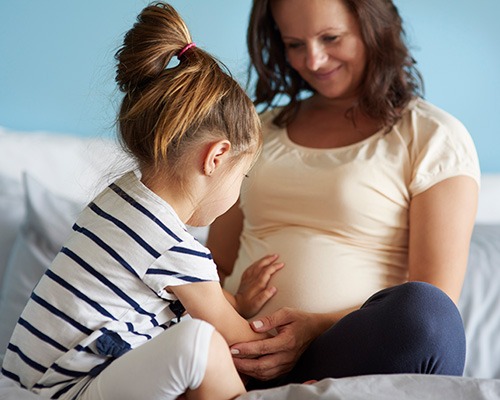
A new baby brings joys and challenges to a family. You’re excited, but you may also be nervous about how your older children will react to the newborn.
All sorts of questions come up: How should we tell our older children that they are going to have a baby brother or sister? Will they be jealous of the new baby? How can we help them get along?
CHILDREN OF DIFFERENT AGES WILL REACT DIFFERENTLY TO A NEW BABY.
 Knowing what to expect from each age group will make it easier to handle the changes in your family.
Knowing what to expect from each age group will make it easier to handle the changes in your family.
Toddlers – Ages 1 To 2 Years
Children of this age will not understand much about what it means to have a new brother or sister. However, let your child hear you talk about the “new baby” and feel your excitement. She may not understand why you are excited, but your attitude will rub off on her and she will feel excited too.
Keep in mind, you may not be able to satisfy the needs of both children all the time—especially not by yourself. If you feel overwhelmed, look to your partner, other relatives, and friends for support and an extra set of arms.
- Look at picture books about a new baby. At the very least, your child will become familiar with words like “sister,” “brother,” and “new baby”.
- When the new baby arrives, try to do something special for your older child. Reassure her that she is still loved. Some ideas include giving her a special gift, letting her spend some time alone with dad, grandma, or another special adult, or taking her someplace special.
Preschoolers – Ages 2 To 4 Years
At this age, your child is still very attached to you and does not yet understand how to share you with others. Your child also may be very sensitive to change and may feel threatened by the idea of a new family member. Here are some suggestions that may help ease your preschooler into being a big brother or big sister.
- Wait a while before telling your preschooler about the baby. Explain it to your child when you start buying nursery furniture or baby clothes or if he starts asking about mom’s growing “stomach.” Picture books for preschoolers can be very helpful. So can sibling classes (ask your hospital if it offers them). Try to tell your child before he hears about the new baby from someone else.
- Be honest. Explain that the baby will be cute and cuddly but will also cry and take a lot of your time and attention. Also, make sure that your older child knows that it may be a while before he can play with the new baby. Reassure your child that you will love him just as much after the baby is born as you do now.
- Involve your preschooler in planning for the baby. This will make him less jealous. Let him shop with you for baby items. Show him his own baby pictures. If you are going to use some of his old baby things, let him play with them a bit before you get them ready for the new baby. Buy your child (boy or girl) a doll so he can take care of “his” baby.
- Time major changes in your child’s routine. If you can, finish toilet training or switching from a crib to a bed before the baby arrives. If that is not possible, put them off until after the baby is settled in at home. Otherwise, your child may feel overwhelmed by trying to learn new things on top of all the changes caused by the new baby.
- Expect your child to regress a little. For example, your toilet-trained child might suddenly start having “accidents,” or he might want to take a bottle. This is normal and is your older child’s way of making sure he still has your love and attention. Instead of telling him to act his age, let him have the attention he needs. Praise him when he acts more grown-up.
- Prepare your child for when you are in the hospital. He may be confused when you leave for the hospital. Explain that you will be back with the new baby in a few days.
- Set aside special time for your older child. Read, play games, listen to music, or simply talk together. Show him that you love him and want to do things with him. Also, make him feel a part of things by having him cuddle next to you when you feed the baby.
- Ask family and friends to spend a little time with your older child when they come to see the new baby. This will help him feel special and not left out of all the excitement. They might also give him a small gift when they bring gifts for the baby.
- Have your older child spend time with dad. A new baby presents a great opportunity for fathers to spend time alone with older children.
School-Aged Children – Ages 5 and above
Children older than 5 years are usually not as threatened by a new baby as younger children are. However, they may resent the attention the new baby gets. To prepare your school-aged child for a new baby,
- Tell your child what is happening in language she can understand. Explain what having a new baby means and what changes may affect her—both the good and the not so good.
- Have your older child help get things ready for the new baby by fixing up the baby’s room, picking out clothes, or buying diapers.
- If possible, have your older child come to the hospital soon after the baby is born so she feels part of the growing family.
- When you bring the new baby home, make your older child feel that she has a role to play in caring for the baby. Tell her she can hold the baby, although she must ask you first. Praise her when she is gentle and loving toward the baby.
- Do not overlook your older child’s needs and activities. Let her know how much you love her. Make an effort to spend some time alone with her each day; use that as a chance to remind her how special she is.
Source www.healthychildren.org